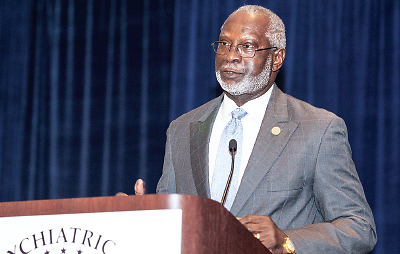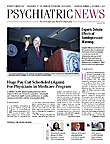To eliminate health disparities, “we need leaders who care enough, know enough, do enough, and will persist until the job is done,” said David Satcher, M.D., Ph.D., in a keynote address at the Opening Session of APA’s 2014 Institute on Psychiatric Services in San Francisco.
Satcher, who served as surgeon general under President Clinton, is director of the Satcher Health Leadership Institute (SHLI) at Morehouse School of Medicine. The mission of the SHLI is to develop a diverse group of public-health leaders, foster and support leadership strategies, and influence policies and practices toward the reduction and ultimate elimination of disparities in health with the focus on underserved populations and neglected diseases, while giving priority to health promotion and disease prevention.
“By providing the education, skills, and ongoing support to advocates, the SHLI will not only improve the lives of those who suffer from our system’s disparities, but will also strengthen the system’s infrastructure and the quality of care for all,” according to the SHLI website. “Left unchecked, the crisis of our current system will jeopardize the future of millions of people worldwide.”
Current programs of the SHLI include the Center of Excellence for Sexual Health; Community Voices: Healthcare for the Underserved, a national program that works with eight communities in areas that are home to some of the nation’s most underserved populations, such as immigrants and homeless people; Division of Health Policy; Division of Health Promotion and Disease Prevention; and Division of Behavioral Health.
The mission of the Division of Behavioral Health is to reduce and ultimately eliminate disparities in behavioral health, including mental health, substance abuse, and developmental disabilities. Specific programs within the division include Three-Dimensional Mental Health and a Post-Doctoral Health Policy Leadership Fellowship on Mental Health.
Satcher emphasized that eliminating health disparities was not possible without addressing the mental health needs of underserved populations, noting that “there is no health without mental health.” He recalled that in 1999, the first surgeon general’s report on mental health was released, and he said the report emphasized some important fundamental messages that have taken root; among these is the importance of integrating mental health and general medical care. He cited statistics showing that mental illness is the leading cause of disability worldwide.
But he noted as well that among the challenges in overcoming stigma and eliminating mental health disparities are cultural barriers. “Culture does impact how people manifest, present, and describe their conditions; how they cope; and whether they are willing to seek treatment,” he said.
He outlined the characteristics of leaders and the special challenges confronting the development of effective policies that can help to eliminate disparities. Citing the words of the Rev. Martin Luther King Jr., Satcher said that leaders are those who take a stand “at times of challenge and controversy.”
Leadership is “a team sport,” he said, pointing out that the most effective way of approaching health disparities is through a “close-knit team of all working toward improving the health of the community.” He added, “Leadership is not position dependent, but to be found in all types of positions. And real leadership transforms communities, especially when it is exercised as a team sport.”
Finally, Satcher said leadership needs to be intergenerational, and he likened it to a relay race. “We take the baton and we run our race as best we can, then pass the baton to the next generation. So much of what gets lost in leadership is in the passing of the baton. We get involved and do our best, but we don’t manage to pass the baton.”
One of the most prominent challenges in combatting disparities is misinformation about health and mental health—such as the stigma long attached to mental health problems. And he cited current fears about the Ebola virus—fed by relentless media coverage—as evidence that “irrational beliefs can be more powerful than science.”
Linking evidenced-based science to rational public policy is the key to eliminating disparities. “We need the science,” he told the psychiatrists at the session. “We need you to continue to do the science to capture the best of your practices so that everyone can learn from it. And we all need to [advocate for effective policies]. This dynamic interaction between science and public policy is critical to improving public population health.” ■
Information about the Satcher Health Leadership Institute can be accessed
here.

